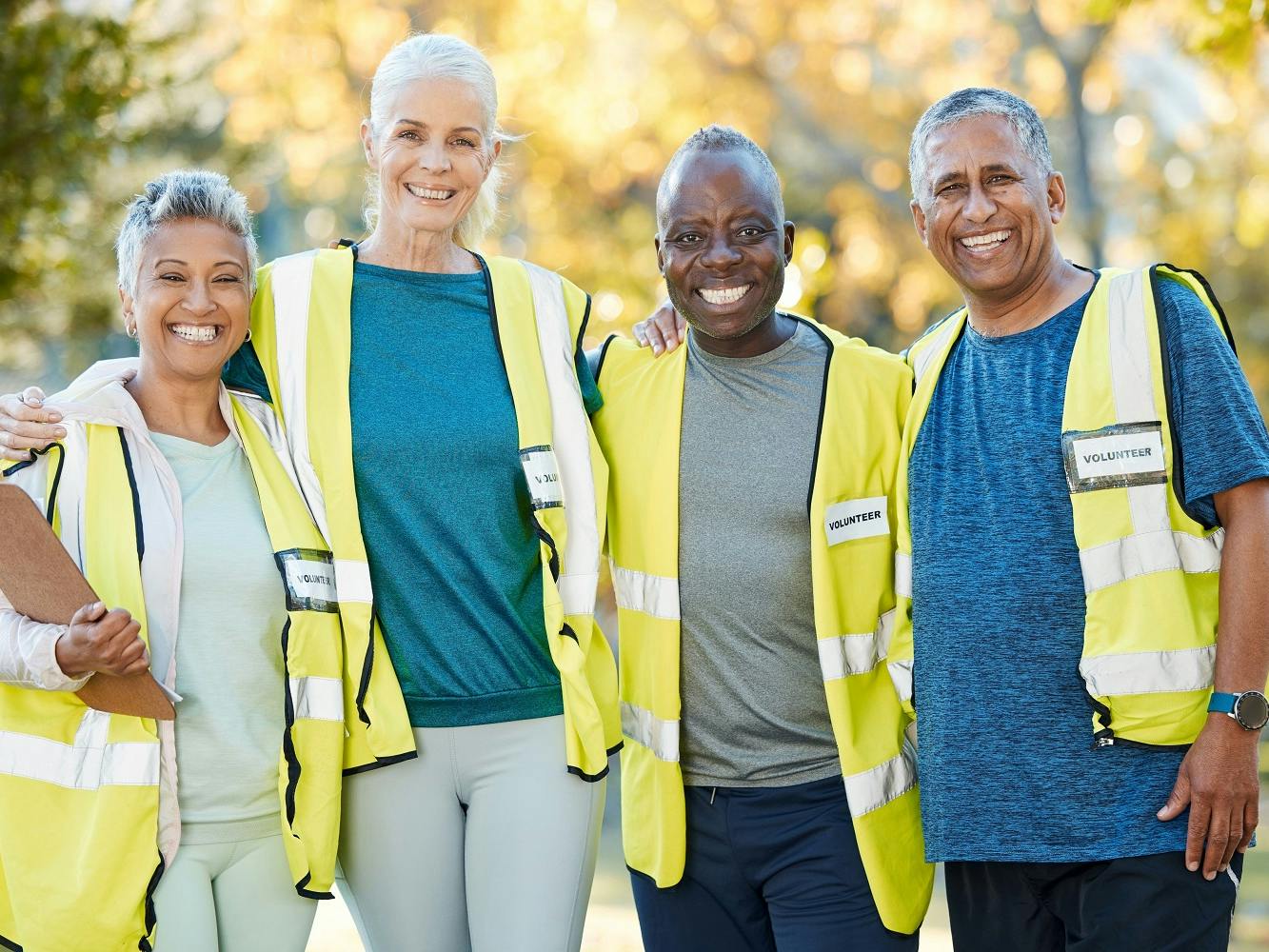
Volunteering helps others – and it can have benefits for you, too. Maybe that’s why so many people do it! Get ideas to join in.
Mon-Thur 9am-7pm | Fri 9am-6pm EST
There are so many good causes to support in the world: feeding hungry children, providing healthcare to people who don’t have it, improving education, saving animals, and many, many more. No matter what issue you care about, there’s a good cause working to make it better.
More than half of Americans give money to charity, adding up to a whopping $500 billion every year. But as you get older, sending money might start to pinch, especially if you’re on a fixed income. You may also be concerned about whether a charity is using your money well.
The good news is that there are plenty of ways to help the causes you care about without sending money. And not only will you be helping people who need it, you’ll get some rewards yourself, too - as shown in several studies that prove people who help others get very real benefits to their bodies and minds.
The good of doing good
When you give gifts or help other people, your brain makes some “feel good” chemicals, including serotonin that helps steady your moods, dopamine that makes you feel good, and oxytocin that gives you a “connected” feeling (it’s sometimes called the love hormone or cuddle chemical). In fact, volunteering lowers rates of depression and anxiety, especially for people 65 and older.
Some of the body benefits from giving or volunteering can include lower blood pressure, less stress, and even living longer. Volunteering can be social, too. About one in four adults over 65 do some kind of volunteering, with Baby Boomers spending 2.2 billion hours a year at it. That makes it a great way to make new friends who share your values and life experiences.
Learn 6 ways to make friends during retirement.
What you can do
These social, mind, and body benefits have nothing to do with dollars. Giving your time can be just as valuable as - or maybe even better than - giving money.
Help a neighbor
You could care for a neighbor’s pet when they go out of town, or bring groceries to a sick relative. Any time you’re generous, you can get a “helper’s high” – the mood boost that makes you healthier and happier.
Help out in your neighborhood
Ask local community groups about how to volunteer. Parks, museums, community gardens, animal shelters, schools, hospitals, food pantries, and churches and other places of worship are often grateful for help.
Check out national organizations
Look for nearby offices of national organizations, like Habitat for Humanity, Feeding America, and The Alzheimer’s Association. They’re often looking for volunteers, too.
Mentor at workplaces
If you have work experience, you can become a mentor for your former employer - or for one in the same field. Ask at local colleges and libraries if you can help younger people develop their careers.
Volunteer from your house
If you can’t get to others because of health or transportation issues, you can offer language or literacy tutoring online, help write letters or stuff envelopes for causes you support, or use social media to promote those causes.
“There are opportunities for everyone that match with their interests and the time they have available to volunteer,” Rick Cohen, chief communications officer at the National Council of Nonprofits in Washington, D.C., told U.S. News & World Report.
Do what you love
Here are ways to put your hobbies and interests to good use.
Crafting
Are you a passionate knitter or crocheter? Do you like woodworking? Use your skills to make handmade items such as blankets for shelters, toys for homeless or hospitalized children, or items that can be sold at charitable fundraising events.
Reading
Many libraries and schools welcome volunteers to read to children.
Animals
Your local animal shelter will almost certainly welcome help in socializing cats or walking dogs. If you’re up for more, consider fostering a furry friend for a few weeks.
Find out how animals can be good for your health.
Gardening
If you’ve got a green thumb and there’s a community garden or garden club nearby, volunteer your time and expertise to help things grow. Or ask your town if they have a spot that needs some beauty added. They might have a budget, or you can ask around for plant donations.
Driving
If you’ve got a car or truck and enjoy driving, you can help deliver food to sick and homebound neighbors for organizations like Meals on Wheels. Some towns also have programs to help drive people to doctors’ appointments or give safe rides to people who need a lift.
More ways to find volunteer spots
Many national programs are happy to recruit and train seniors for volunteer work.
AmeriCorps Seniors
The largest volunteer network for people aged 55 and over, this organization matches over 140,000 seniors each year with ways to give back. They have three programs: Foster Grandparent, Senior Companion, and RSVP (Retired and Senior Volunteer Program). The RSVP program matches seniors with thousands of organizations nationwide who are looking for volunteers.
The USO
Sometimes the men and women who serve in the armed forces can use a little help themselves. There are local chapters of the USO across the country, and volunteers may work at special events, greet homecoming veterans, or just lend a sympathetic ear.
The National Parks Service
This government agency takes care of 85 million acres of land at over 400 sites across the country, and they’re always looking for helping hands. You can do rugged tasks like trail cleaning, learn how to lead tours, or work in a gift shop. Other government groups like the U.S. Forest Service and U.S. Fish and Wildlife Service need volunteers, too.
Still not finding the right fit? Check out VolunteerMatch.org. This site helps anyone at any age find good volunteer opportunities close to home. On their website, you can search by location and interest. Just put in your ZIP code, choose the causes that are important to you, and check a list of skills to see what options you have in your area.
However you decide to help, your time and skills will be very much appreciated. And you’ll be making a difference in other people’s lives – and in your own, too.
How Medicare can help
People who volunteer are proven to live longer than those who don’t. Another way to increase your longevity? Good preventive care, which you can get with a Medicare Advantage plan. Make sure you schedule the vaccines, screening tests, and physical exams that will help keep you healthy and in good shape so you can help others for many years to come. To compare plans in your area, check out our easy-to-use Find a Plan tool.
Additional resources
- ClearMatch Medicare: Find a Medicare Plan
- VolunteerMatch.org
- Lending Tree: “56% of Americans Donated to Charity in 2021, at Average of $574”
- Axios: “Americans are giving to charity at lowest level in nearly 3 decades”
- Cleveland Clinic: “Why Giving Is Good for your Health”
- Mayo Clinic: “Helping People, Changing Lives”
- Journal of Health Psychology: Volunteerism and Mortality among the Community-dwelling Elderly
- Silver Sneakers: 10 Amazing Organizations for Senior Volunteers
- US News & World Report: Volunteer Opportunities for Seniors



